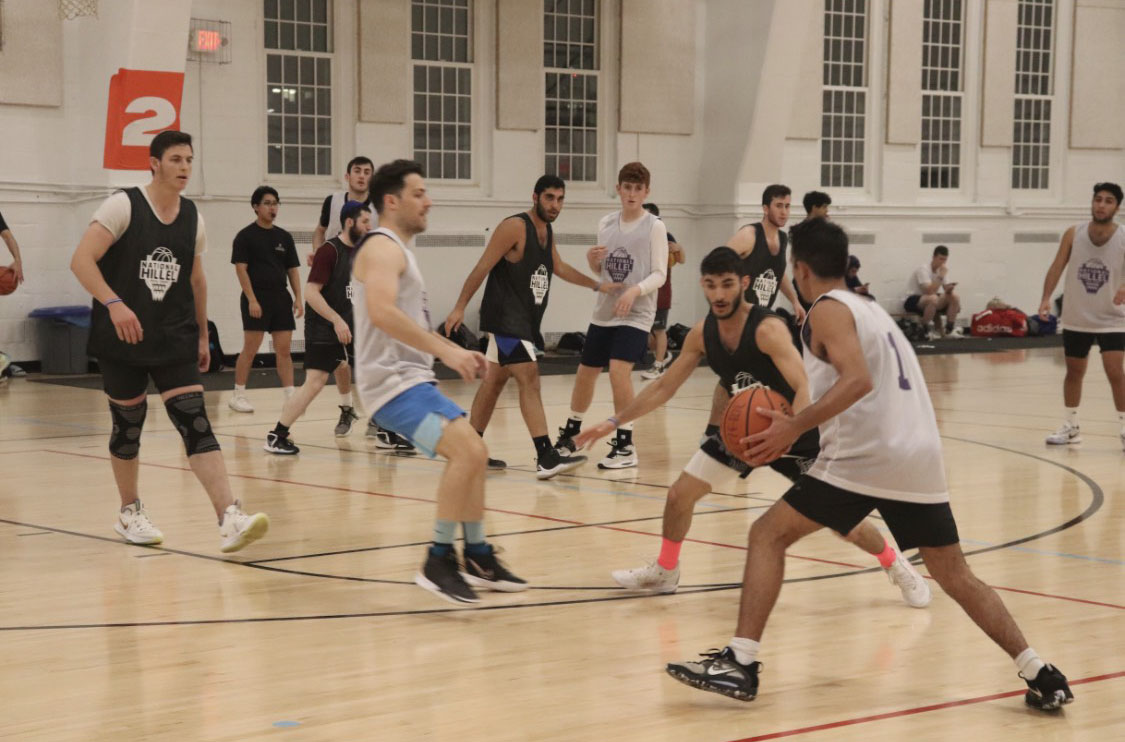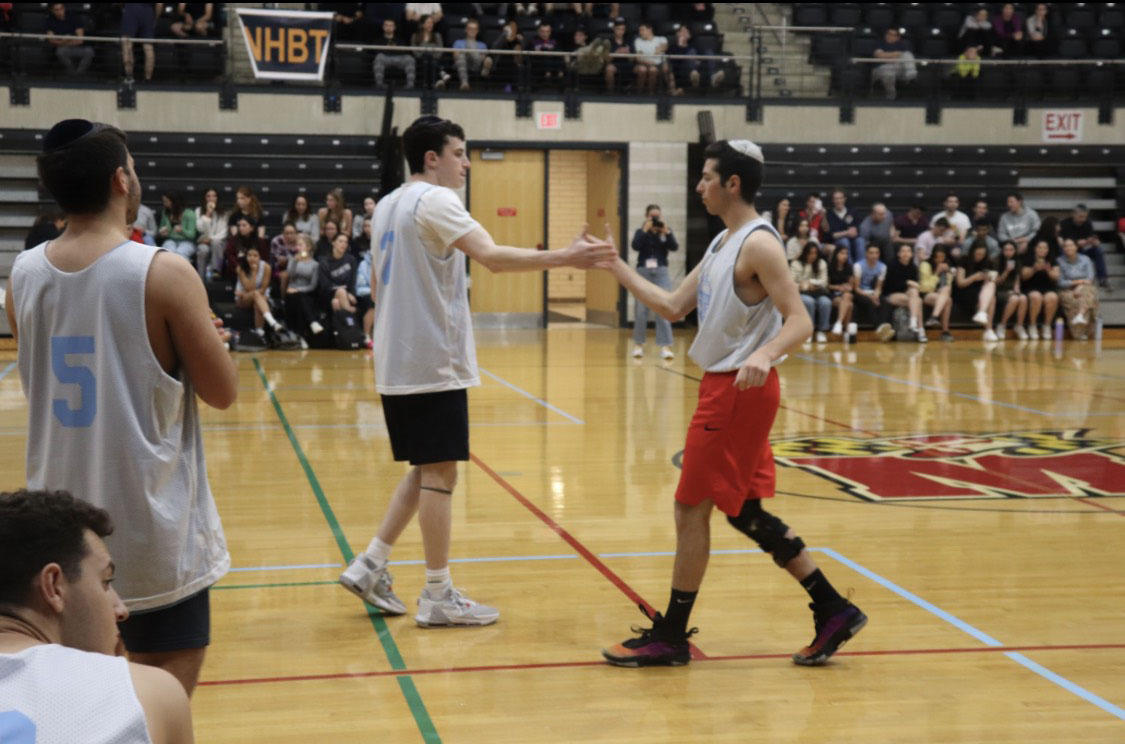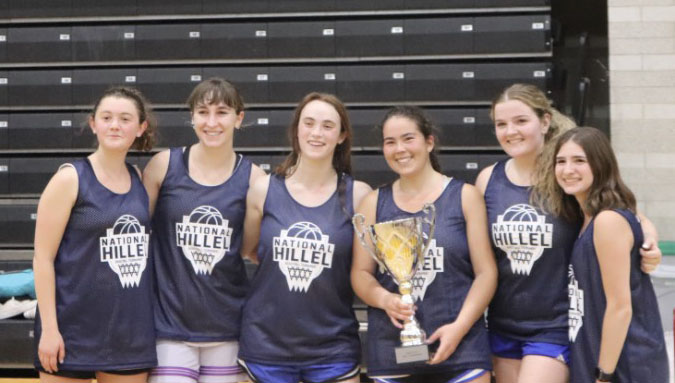
While NCAA Basketball March Madness rages on from the Sweet Sixteen to the Elite Eight to the Final Four, the Hillel at the University of Maryland, College Park is hosting its own annual tournament. The National Hillel Basketball Tournament (NHBT), now in its 14th year, is made up of students from schools from across the U.S. and runs from March 28 to 31 at the College Park campus, just north of Washington, D.C.
Since it began in 2010, the NHBT has grown; there are 55 teams competing this year, in both the men’s and women’s division.
“The scale of this tournament is massive, and it’s inspiring to see how it brings together the Jewish student community from across the country,” Kanefsky told the Journal. “It’s a testament to what we can achieve when we come together, showcasing sportsmanship, community, and Jewish pride.”
The 20 students running the tournament work year-round. The tournament’s steering committee features two Angelenos and alumni of Shalhevet Jewish School, Abbi Sentchuk and Yakir Kanefsky.
Although the vast majority of the teams are made up of students from their respective schools, there are “free agents” who come to College Park and join another school’s team. The teams range in size from 5 to 8 players. Schools that routinely field a team include Maryland-College Park, Michigan-Ann Arbor, Miami University and SUNY Binghamton. Over the tournament’s 14 year history, 74 schools have participated, from universities with large Jewish student bodies to colleges that barely have enough Jews to field a basketball team, much less a minyan.
“It pretty much is like a shabbaton right in the middle of the whole tournament,” Kanefsky said. “Friday everyone plays their games, but then we have multiple minyanim; I think both a Conservative one and Orthodox one. So obviously college students have different religious observance levels coming in. Friday night we rent out a nice hall on campus for 500 people to all have Friday night dinner together. And then Saturday during the day, there is davening in the morning, and then a big Shabbat lunch with all the players in the Hillel building. A lot of people just end up kind of hanging around the Hillel and just talking to their friends, meeting new people.”
It’s commonplace for members on the steering board to get involved and stay involved with NHBT for their entire college career.
“It’s incredible to see how it has evolved, hosting 55 teams from different schools, Sentchuk said. “We’ve built a community here, bringing together girls and boys teams from across America for a weekend of intense basketball and camaraderie.”
Both Kanefsky and Sentchuk both emphasize that the NHBT is more than a sports event; it’s a cultural gathering that strengthens Jewish identity among college students. They say that the tournament facilitates a meaningful blending of Shabbat activities, athletic competition, with community, new friends and spiritual connection. Registered participants get three nights in a hotel, kosher meals throughout the weekend, jerseys and some surprise frills leading up to the tournament finals, known as The Kiddush Cup. Although they have used the NCAA Terrapins home court at the 17,950-seat XFINITY Center for the final game in years past, it was not available this year, so the final will be at the Terps’ former home, the 1,500 seat Ritchie Coliseum.
The Univerity of Maryland consistently has one of the largest Jewish student bodies in the country. Among their most well-known Jewish alumni are writer and comedian Larry David, Google co-founder Sergey Brin, and investigative journalist Carl Bernstein
“A lot of people don’t really care about sports, but it’s a really fun environment to be a part of,” Sentchuk said. “The tournament is so incredible, at least when I did it the first time. I wanted to be involved in something on campus and to see hundreds of Jews come together and just have the best weekend and know that I was a part of helping make it happen was the reason I loved it. I’m not a huge sports nut, but it’s fun to be on board. It’s fun to work on the tournament and it’s really fulfilling.”
The NHBT also raises funds for a Sha’ar Hanegev Sport Association, an Israeli organization that provides sports equipment to displaced families in Israel.
“It’s about more than basketball,” Sentchuk said. “It’s about uniting Jewish students from various backgrounds and creating lasting memories.”
In fact, the first steering meeting for the 2024 tournament was supposed to be the week after Oct. 7.
“This tournament is so much more important this year than any other year. Bringing Jews together, showing people we’re still here and we’re proud to be Jewish and just enjoy being Jewish on the college campus is so important for us right now.”
“It felt really weird to start asking people to give us money for a basketball tournament when if people are donating money, it should be going to Israel, it should not be going to this basketball tournament,” Sentchuk said. “So that was a really hard thing to start. But then I think once we got together and really started really seeing antisemitism on our campus and campuses across America, we really felt like this tournament is so much more important this year than any other year. Bringing Jews together, showing people we’re still here and we’re proud to be Jewish and just enjoy being Jewish on the college campus is so important for us right now. And I think once we really thought about it deeply and reframed, it definitely felt like the tournament had a much bigger purpose.”
For more information about the National Hillel Basketball Tournament, go to the tournament’s website.























 More news and opinions than at a Shabbat dinner, right in your inbox.
More news and opinions than at a Shabbat dinner, right in your inbox.